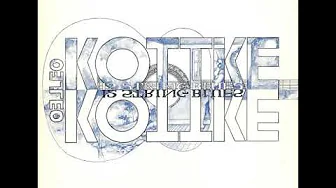Leo Kottke - 12 String Blues (1969 Full Album)

Details
| Title | Leo Kottke - 12 String Blues (1969 Full Album) |
| Author | Rafa Jimi |
| Duration | 34:43 |
| File Format | MP3 / MP4 |
| Original URL | https://youtube.com/watch?v=wPIRd21-YXQ |
Description
12-String Blues (sub-titled Live at the Scholar), is the first album by American guitarist Leo Kottke, released in 1969.
History
The majority of the album was recorded live at The Scholar, a Minneapolis coffee house (formerly known as the Ten O'Clock Scholar in another location) that had also featured Bob Dylan, Spider John Koerner and Simon & Garfunkel early in their careers. Three of the instrumentals were recorded in a studio. The LP record was a limited edition of 1000 copies, on the Minneapolis West Bank-based Oblivion Records, and has not been reprinted and/or re-issued on CD. Publishing for the songs was by Symposium Music, same as the publishing and record label for Kottke's third LP.
Most of the songs on the album were re-recorded for Kottke's album Circle Round The Sun.
Leo Kottke (born September 11, 1945 in Athens, Georgia) is an American virtuoso on the acoustic six- and twelve-string guitar who, over a career spanning more than 45 years, has influenced a number of guitarists. Kottke fused folk, country, bluegrass, and blues influences into a distinctive fingerpicking style of polyphonic music, which, especially in its early stages, was heavily influenced by the slide guitar technique using a bottleneck. From the 1980s onward, Kottke anticipated much of the New Age instrumental music movement and is often considered part of the American Primitivism movement—partly because he was signed to John Fahey's Takoma Records label. Kottke struggled with health problems for a long time, including partial numbness and tendonitis in his hands.
Life and Work
As a teenager in Muskogee, Oklahoma, Kottke played trombone and violin before switching to guitar, where he developed his own distinctive fingerpicking style. A fireworks accident permanently damaged his hearing in one ear, which was further aggravated by target practice while serving in the United States Naval Reserve. After his discharge from the Naval Reserve, Kottke attended St. Cloud State University in central Minnesota, where he often skipped classes to play guitar instead.
Although his focus is on instrumental compositions, Kottke utilized his unconventional, sonorous baritone, which he described as "goose farts on a dull day," especially on some of his early albums. In his solo concerts, Kottke offers a selection of vocal and instrumental pieces from several decades, played on custom-made six- and twelve-string guitars, regularly enlivening his musical performance with humorous and surreal remarks. While he often favored open tunings in the early stages of his career, in recent years he has increasingly used more traditional tunings, often tuning his guitars up to two whole steps below standard tuning.
Kottke's best-known album is 1969's 6- and 12-String Guitar, also known as the "Armadillo Album" because of the armadillo depicted on the cover. Pushed by his record company in the early 1970s to become a folk singer-songwriter rather than a pure instrumentalist, he recorded albums with accompanying musicians such as Mudlark, Ice Water, and Chewing Pine. Some recordings from this period are now outdated, and in recent years Kottke has begun re-recording various pieces from the early 1970s. For example, 1999's "One Guitar, No Vocals" features a new instrumental version of 1974's "Morning Is the Long Way Home," highlighting the countermelody that was hidden behind the vocals on the older recording.
Constant concert and studio work took their toll on Kottke in the early 1980s, and he suffered from painful tendonitis and associated nerve damage, which threatened his career. He changed his picking style from a folk-based approach (using fingerpicks) to a more classical style (using fingertips and increasingly less use of fingernails, as well as a modified right-hand position) that placed less strain on the tendons. At the same time, he moved from the larger labels Capitol and Chrysalis to the smaller Private Music label, and his music became increasingly more lyrical and less excessive. Due to this stylistic shift and his relationship with Private Music, Kottke's work from this period has often been characterized as New Age music in the Windham Hill style, although his music remained too eclectic and edgy to fit into this category.
Kottke has collaborated on his recordings with his mentor John Fahey, Chet Atkins, Lyle Lovett, Margo Timmins of the Cowboy Junkies, the Violent Femmes, and Rickie Lee Jones. In addition to original compositions, he has recorded pieces by Tom T. Hall, Johnny Cash, Carla Bley, Fleetwood Mac, The Byrds, Jorma Kaukonen, Kris Kristofferson, Randall Hylton, and many others. He is also a frequent guest on the US radio show A Prairie Home Companion.
In 2002, Kottke collaborated with Mike Gordon (bassist of the band Phish) on Clone, an album featuring instrumental and vocal pieces by both musicians. A second album with Gordon, Sixty Six Steps, followed in 2005, and the duo toured with both programs.
- Wiki